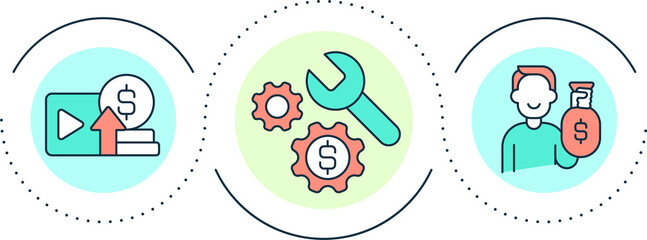Introduction
Blogging has evolved from a hobby to a viable source of income for many. The rise of blogging as a career path has opened doors for individuals to share their passions and expertise while earning money. But how exactly can you turn a blog into a profitable venture? Why blogging can be profitable lies in the various monetization strategies available, from ad revenue to selling products and services.
Choosing Your Niche
Importance of a Niche
Choosing a niche is crucial for blogging success. A specific niche helps you target a defined audience, making it easier to create content that resonates with readers. A well-defined niche not only attracts a dedicated audience but also makes it easier to monetize your blog through targeted advertising and affiliate marketing.
Finding Your Passion and Expertise
To find your niche, think about what you are passionate about and where your expertise lies. This combination ensures you will enjoy writing and can provide valuable insights to your readers. Passion and expertise are key ingredients for creating engaging and authentic content.
Setting Up Your Blog
Selecting a Blogging Platform
The first step in setting up your blog is choosing a platform. Popular options include WordPress, Blogger, and Wix. WordPress is highly recommended for its flexibility and wide range of plugins that can enhance your blog’s functionality.
Designing Your Blog
A well-designed blog attracts and retains readers. Choose a clean, professional theme that reflects your niche. Design elements like easy navigation, fast loading times, and mobile-friendliness are essential for providing a good user experience.

Creating Quality Content
Writing Engaging Posts
Content is the heart of your blog. Writing engaging posts that provide value to your readers will keep them coming back. Use a conversational tone, ask questions to engage readers, and provide actionable insights.
The Role of SEO
Search Engine Optimization (SEO) is critical for driving traffic to your blog. SEO techniques like keyword research, on-page optimization, and link building help your blog rank higher in search engine results, making it more visible to potential readers.
Growing Your Audience
Utilizing Social Media
Social media is a powerful tool for promoting your blog. Share your posts on platforms like Facebook, Twitter, and Instagram to reach a wider audience. Engage with your followers and join relevant groups to increase your blog’s visibility.
Networking with Other Bloggers
Building relationships with other bloggers in your niche can lead to guest posting opportunities and collaborations. Networking helps you reach new audiences and establish your authority in the niche.
Monetizing Your Blog
Ad Revenue
One of the most common ways to monetize a blog is through ad revenue. Platforms like Google AdSense allow you to display ads on your blog and earn money based on clicks or impressions. Ad revenue can provide a steady income stream once you have significant traffic.
Affiliate Marketing
Affiliate marketing involves promoting products or services and earning a commission for every sale made through your referral link. Choose affiliate programs that align with your niche and offer products that your audience will find valuable.

Selling Products and Services
Creating Digital Products
Creating and selling digital products like eBooks, courses, or printables can be highly profitable. Digital products allow you to leverage your expertise and provide additional value to your readers.
Offering Services
If you have a skill that others need, consider offering services such as consulting, coaching, or freelance writing. Offering services can be a lucrative way to monetize your blog and build your personal brand.
Sponsored Content and Collaborations
Partnering with Brands
Brands are always looking for influencers to promote their products. Partnering with brands for sponsored posts or product reviews can be a lucrative income stream. Ensure that any partnerships align with your niche and audience interests.
Writing Sponsored Posts
Sponsored posts involve writing content that promotes a brand’s product or service. Writing sponsored posts can be profitable, but it’s important to disclose these partnerships to maintain transparency with your readers.

Building an Email List
Importance of an Email List
An email list is a valuable asset for any blogger. It allows you to communicate directly with your audience, promote your content, and sell products or services. Building an email list should be a priority from day one.
Strategies for Growing Your List
Offer incentives like free eBooks, checklists, or courses to encourage readers to subscribe to your email list. Use lead magnets and opt-in forms to capture email addresses and grow your list.
Using Analytics to Improve
Tracking Your Traffic
Using analytics tools like Google Analytics helps you understand where your traffic is coming from and how readers interact with your blog. Tracking your traffic provides insights into what content is performing well and where you can improve.
Understanding User Behavior
Analyzing user behavior on your blog helps you optimize the user experience. Understand which pages are most popular, how long visitors stay, and where they drop off to make data-driven improvements.
Diversifying Income Streams
Exploring Different Revenue Sources
Relying on a single income source can be risky. Explore different revenue streams such as ads, affiliate marketing, product sales, and services to diversify your income. Diversifying income streams ensures financial stability and growth.
Investing in Your Blog’s Future
Reinvest some of your earnings into your blog to keep it growing. Invest in tools, courses, or hiring help to improve your content and marketing efforts.
Staying Consistent and Persistent
Setting a Posting Schedule
Consistency is key to blogging success. Set a posting schedule that you can stick to, whether it’s weekly or bi-weekly. A consistent posting schedule keeps your audience engaged and returning for more.
Overcoming Challenges
Blogging can be challenging, especially in the beginning. Stay persistent, keep learning, and don’t get discouraged by setbacks. Overcoming challenges and staying committed will lead to long-term success.
Legal and Ethical Considerations
Disclosing Sponsored Content
Transparency is crucial when working with brands. Always disclose sponsored content to maintain trust with your readers. Disclosing sponsored content is not only ethical but also a legal requirement in many countries.
Protecting Your Intellectual Property
Protect your blog’s content and brand by understanding copyright laws and taking steps to safeguard your intellectual property. Protecting your intellectual property ensures your hard work isn’t exploited by others.
Case Studies
Successful Bloggers
Studying successful bloggers can provide valuable insights and inspiration. Look at how they built their audience, monetized their blog, and overcame challenges. Learn from their experiences to apply similar strategies to your own blog.
Lessons Learned
Every blogger’s journey is unique, but common lessons include the importance of quality content, consistency, and understanding your audience. Lessons learned from others can help you avoid common pitfalls and accelerate your success.
Conclusion
Blogging offers a unique opportunity to share your passions, connect with others, and earn money. By choosing a niche, creating quality content, growing your audience, and exploring various monetization strategies, you can turn your blog into a profitable venture. Stay consistent, keep learning, and don’t be afraid to invest in your blog’s future. The path to blogging success may have its challenges, but the rewards are well worth the effort.

FAQs (Frequently Asked Questions)
- How long does it take to make money blogging? The time it takes to make money from blogging varies widely. Some bloggers may start earning within a few months, while others might take a year or more. It depends on factors like niche selection, content quality, SEO, and marketing efforts.
- Can you blog part-time? Yes, you can blog part-time. Many successful bloggers started while working full-time jobs. Consistency is key, so setting a manageable posting schedule that fits your lifestyle is important.
- What are the initial costs of starting a blog? Starting a blog can be relatively inexpensive. Costs include domain registration (around $10-15 per year), hosting (starting at $3-10 per month), and possibly premium themes or plugins. However, you can start with free options and upgrade as your blog grows.
- How much can you earn from blogging? Earnings from blogging can range from a few dollars a month to thousands, depending on traffic, monetization methods, and niche. Top bloggers can earn six figures annually, but it typically requires time, effort, and strategic planning.
- What are the common mistakes to avoid? Common mistakes include not having a clear niche, neglecting SEO, inconsistent posting, and failing to engage with your audience. Additionally, not investing in quality hosting or design can hinder your blog’s growth.





